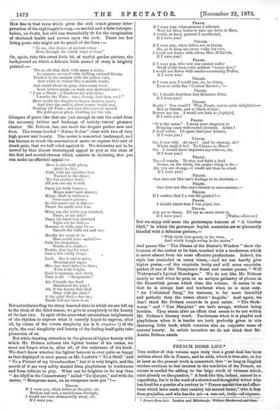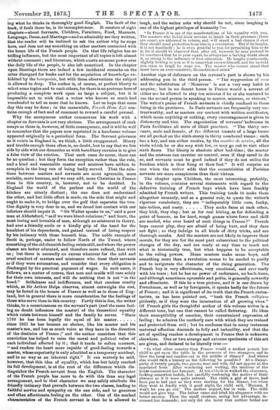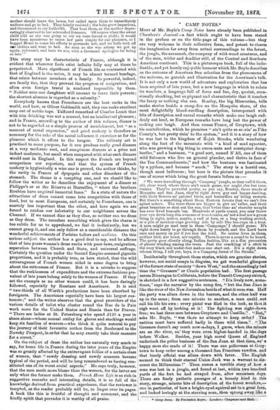FRENCH HOME LIFE.*
THE author of this volume says truly that a great deal has been written about life in France, and he adds, which is true also, as far at least as the present work is concerned, that " so long as English readers continue to feel interest in the condition of the French, no excuse is needed for adding to the large stock of volumes which, exist already on the question." A book like this, indeed, cannot be a superfluity, for it is the work of a shrewd and thoughtful writer who has lived for a quarter of a century in " France amidst ties and affec- tions which have made that country his second home," who is free from prejudice, and who has the art—a rare art, truly—of express- French Home Life. London and Edinburgh: William BbAkwood and Sons. ing what he thinks in thoroughly good English. The fault of the book, if fault there be, is its incompleteness. It consists of eight chapters—about Servants, Children, Furniture, Food, Manners, Language, Dress, and Marriage—and so admirably are they written, that the reader will be inclined to ask the author why he stops here, and does not say something on other matters connected with the home life of the French people. On that life religion has no trifling influence, but the most important of all topics is left almost without comment ; and literature, which exerts no mean power over the daily life of the people, is also left unnoticed. In the chapter upon Marriage there are indeed a few incidental remarks on the utter disregard for books and for the acquisition of knowledge ex- hibited by the bourgeoisie, but with these observations the subject is allowed to drop. The author is, of course, at perfect liberty to select some topics and to omit others, for there is no pretence here of producing a complete work upon so large a subject, but it is impossible not to wish that a writer who knows so much had vouchsafed to tell us more that he knows. Let us hope that some day this may be done ; in the meanwhile, French Home Life con- tains enough of fact and of comment to reward a careful perusal.
Why the anonymous author commences his work with a chapter on Servants is not very obvious. The arrangement of such essays as these is, however, of little consequence, and it will be well to remember that the papers now reprinted in a handsome volume appeared originally in a periodical form. The Servant grievance as it exists in England is, we think, a little exaggerated. Misery and trouble enough there often is, no doubt, but to say that we live side by side with our domestics as with hereditary enemies is to give a false view of the relation. That such cases do occur, there can be no question ; but they form the exception rather than the rule, and a kind and reasonable master and mistress have seldom to complain in the long run of being badly served. That the rela- tions between masters and servants are more agreeable, more sociable, more humane, and we may add, more Christian in France than in this country, is, however, not to be doubted. In England the world of the parlour and the world of the kitchen are utterly distinct ; the one does not understand the other, and but little effort is made, on the side that might and ought to make it, to bridge over the gulf that separates the two. Our dignity is very dear to us, and we dread lest contact with our inferiors should impair it. "Sir Walter speaks to us," said a poor man at Abbotsford, " as if we were blood-relations;" and Scott, the most loving and loveable of men, although an aristocrat in theory, had ever a friendly smile or a kindly grip of the hand for the humblest of his dependents, and gained instead of losing respect by his intimacy with those beneath him. The noble example of Scott is, perhaps, easier to follow North of the Tweed, where something of the old clannish feeling exists still, and where the poorer classes are better educated, and therefore more refined, than with us ; but there is assuredly no excuse whatever for the cold and cruel conduct of masters and mistresses who treat their servants as if they were automatons, and consider that every obligation is discharged by the punctual payment of wages. In such cases, it follows, as a matter of course, that men and maids will care solely for their own interests, and will do nothing that is not " in the bond." Selfishness and indifference, and that careless cruelty which, as Sir Arthur Helps observes, almost outweighs the rest, may be found in the homes of France as well as in those of Eng- land, but in general there is more consideration for the feelings of those who serve than in this country. Partly this is due, the writer thinks, to a consciousness on the servant's part (and the same feel- ing no doubt influences the master) of the theoretical equality which exists between himself and the family he serves. "Since
1789 he has been legally the equal of his master since 1851 he has become an elector, like his master and his master's son, and has as much voice as they have in the direction of the destinies of France ;" and the author considers that this conviction has helped to raise the moral and political value of each individual affected by it ; that it tends to soften manners, " and renders the heart more capable of good-feeling towards a master, whose superiority is only admitted as a temporary accident, and in no way as an inherent right." It can scarcely be said, however, that this idea of equality, which has but lately reached its full development, is at the root of the difference which dis- tinguishes the French servant from the English. The character of the French people has more to do with this than any legal arrangement, and to that character we may safely attribute the friendly intimacy that prevails between the two classes, leading to faithful service and sympathy on the one side, and to generous and often affectionate feeling on the other. One of the marked characteristics of the French servant is that he is allowed to laugh, and the writer asks why should he not, since laughing is one of the highest privileges of humanity ?—
" In France it is one of the manifestations of his equality with you. The masters who forbid their servant to laugh in their presence (there are some) are abhorred in return, and will stand a bad chance if over they should need protection from him in a revolution. But if he laughs, , it is not familiarly ; he is even grateful to you for permitting him to do it, for it should be observed that, after all, however ho may pretend to be convinced that he is your equal, he always has a lurking doubt about it, so strong is the influence of first education. He laughs courteously, slightly bowing to you as if to somewhat excuse himself, and the instant you cease to laugh he stops too. The master who cannot stand that must have an over-sensitive, ill-conditioned mind."
Another sign of deference on the servant's part is shown by his addressing you in the third person. " The suppression of ewes and the substitution of Monsieur' is not a very easy habit to acquire ; but in no decent house in France would a servant of either sex be allowed to stay ten minutes if he or she ventured to use the second person in speaking to master, mistress, or visitors." The writer's praise of French servants is chiefly confined to those living in the provinces. In Paris servants are frequently very uu- trustworthy, and as masters are content with written certificates, which mean anything or nothing, every encouragement is given to dishonesty and vice. The organisation of servants' bedrooms in Paris facilitates all sorts of illicit practices. "The thirty ser- vants, male and female, of the different tenants of a large house are all packed on the sixth storey in thirty numbered rooms ; each has a key, and can either receive, by the cscalier de service, all the visits which he or she may wish for, or may go out to visit other sixth floors. The liberty is absolute after bed-time ; the master and the mistress can exercise no control, even if they cared to do so, and servants must be good indeed if they do not utilise the freedom which is thus flung at their feet." It will surprise no one when the writer adds that the eccentricities of Parisian servants are more conspicuous than their virtues.
The chapter upon Children, the most interesting, probably, in the volume, contains several statements with regard to the training of French boys which have been frankly admitted by French writers. This training tends to make them altogether unmanly, and as a general rule, to quote the writer's vigorous vocabulary, they are "indisputably little curs, funky,
tale-tellers, and nasty They make faces at each other, they kick, they slap ; but as for real hitting, as for defending a point of honour, as for hard, rough games where force and skill are needed, who ever heard of such things in France ?" French boys cannot play, they are afraid of being hurt, and they dare not fight ; so they indulge in all kinds of dirty tricks, and are thorough sneaks. And the masters are not likely to improve their morals, for they are for the most part subservient to the political changes of the day, and are ready at any time to teach not what is historically true, but what happens to be acceptable to the ruling powers. Mean masters make mean boys, and something more than a revolution seems to be needed to purify and to invigorate the character of the rising generation. The French boy is very affectionate, very emotional, and ever ready with his tears ; but he has no power of endurance, no back-bone, and although sometimes agreeable and polite, is generally cowardly and effeminate. If this be a true picture, and it is one drawn by Frenchmen, as well as by foreigners, it speaks badly for the future of France ; and it is significant of its truth that the French carica- turists, as has been pointed out, "hash the French collegiens- pitilessly, as if they were the incarnation of all growing vices." Of French girls the thoughtful author of this volume writes in different tone, but one that cannot be called flattering. Ile likes their susceptibility of emotion, their unrestrained expression of feeling ; he admires the motherly care with which they are trained and protected from evil ; but he confesses that in many instances maternal affection descends to folly and imbecility, and that the art of spoiling reaches a development in France that is unknown elsewhere. One or two strange and extreme specimens of this art are given, and declared to be literally true:— "In what other country than France would a mother permit her child to got upon the table in the presence of two strangers, and to blow the lamp and candles out in the middle of dinner ? And where else would each a history as the following be possible ? At a dinner- party of twenty people, two guests, man and wife, did not appear at the appointed hour. After wondering and waiting, the mistress of the hone commenced her banquet. At ten o'clock in walked the absentees, looking somewhat foolish, but candidly confessing the motive of their absence as if it were quite natural. The child, a girl of tbroe, had been put to bed just as they were starting for the dinner, but when they went to fondly wish it good night, the child said, ' Mamma, I won't let you go out.' The mother argued, but in vain. The child would not give way. The father came and tried his eloquence with no better success. Then the small creature, seeing her advantage, in- creased her demands ; not only did she insist that neither father nor mother should leave the house, but called upon them to immediately undress and go to bed. They faintly resisted ; the babe grew imperious, and threatened to cry forthwith. That beat them, as the mother depre- catingly observed to her astounded listeners. 'Of course when the sweet child told us she was going to cry we were forced to yield ; it would have been monstrous to cause her pain simply for our pleasure, so I begged Henri to cease his efforts to persuade her, and we both took off our clothes and went to bed. As soon as she was asleep we got up again, redressed, and here we aro, with a thousand apologies for being so late.' " This story may be characteristic of France, although it is evident that wherever fools exist infinite folly may at times be perpetrated. More significant of French life as contrasted with that of England is the union, it may be almost termed bondage, that exists between members of a family. So powerful, indeed, are family ties, that they prevent the progress of emigration, and often even foreign travel is rendered impossible by them. 4, Neither sons nor daughters will consent to leave their parents ; the shortest absence is regarded as a calamity."
Everybody knows that Frenchmen are the best cooks in the world, and how, as Oliver Goldsmith said, they can make excellent soup out of nettle., tops. Talfourd remarked of Charles Lamb that with him drinking was not a sensual, but an intellectual pleasure ; and in France, according to the author of this volume, dinner is not to be regarded as a simple process of nourishment, but " as a moment of moral expansion," and good cookery is therefore as necessary for the sake of the moral influence it exercises as for the pleasure which it offers to the tongue. The culinary art is practised to some purpose, for it can produce really good dinners at a very moderate cost, and sumptuous dinners at a price not indeed moderate, but small when compared with what such dinners would cost in England. In this respect the French are beyond comparison our superiors, and that the system of French cookery is hygienically a wise one is proved, the author thinks, by the rarity in France of dyspepsia and other disorders of the stomach. The theme is a tempting one, and we should like to follow the writer as he describes the enjoyment of a dinner at Philippe's or at the Reserve at Marseilles, " where the brothers Roubion have acquired immortal fame." In a state of nature the attractions of dress cannot come into competition with those of food, but to most Europeans, and certainly to Frenchmen, one is scarcely less important than the other, and here again we are forced to confess our inferiority to our neighbours across the Channel. If we cannot dine as they dine, so neither can we dress as they dress. The nameless something which gives the charm is too subtle for as to apprehend, we feel it indistinctly, but we cannot grasp it, and can only follow at a considerable distance the wonderful achievements of Parisian tailors and modistes. On this serious subject the author has a good deal to say, and he affirms that of late years woman's dress ranks with poor-laws, emigration, separation between Church and State, and universal suffrage. Certainly the question under the Second Empire assumed gigantic proportions, and it is probably true, as here stated, that the wild extravagance of French women aided in some degree to bring about the rottenness of France. But it is a mistake to suppose that the recklessness of expenditure and the extreme fashions pre- valent of late years belong solely to the women of France. If they set the example as no other women could, it has been daringly followed, especially by Russians and Americans. It is said " two-thirds of all Worth's productions have been absorbed by foreigners. The Americans especially have been his largest cus- tomers ;" and the writer observes that the great providers of the various details of toilet who cluster round the Rue de Is Paix work more for the United States and Russia than for France. "There are ladies at St. Petersburg who spend £120 a year in shoes alone—whose annual outlay for gloves and stockings would keep six families of weavers—who think_ it quite natural to pay the journey of their favourite author from the Boulevard to the
Newsky Prospect, in order that he may exactly take their measure for a corset."
On the subject of dress the author has naturally very much to say, for home life is France during the later years of the Empire was so greatly affected, by the extravagant follies of a certain class of women, that ." rowdy dressing and rowdy manners became typical of the period, and will be long remembered as having con- stituted one of its worst social aspects." He says truly, however, that the men merit more blame than the women, for the latter are only what the former make them. French Home Life is so rich, in suggestive remarks and interesting details, it is so full of the knowledge derived from practical experience, that the reviewer is tempted, as the reader probably will be, to linger over its pages. A book like this is fruitful of thought and comment, and the kindly spirit that pervades it is worthy of all praise.




































 Previous page
Previous page